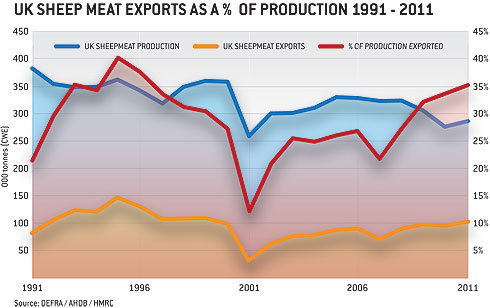UK sheepmeat exports – markets and opportunities

The UK is the fourth largest sheepmeat producer globally, exporting 102,000t in 2011, making it one of the UK’s biggest exported agricultural commodities.
The vast majority goes to Europe, but there are some less obvious buyers and new customers.
What the market wants
The export specification for sheep is a target weight band that maximises the number of markets to which the carcasses and cuts can be sold.
Largely, this ensures they are fit for EU markets which do not want over-fat animals.
The export spec is 25.5-43kg liveweight and lambs within the top 25% are fetching a 25p/kg premium.
The average price for the export band in the week ending 1 June was 185.2p/kg. Lambs in the top 25% of the band fetched 227.2p/kg.
Prices for lambs in the top 25% have held up well during the recent fall off in sheep prices. By selling sheep to this specification, producers will be maximising their returns, said EBLEX.
Recent Achievements
With 60% of exports going there and volumes still growing, France is our biggest buyer of sheepmeat – however, volumes to other EU countries, particularly Germany, the Netherlands and Belgium, have grown this year.
This makes us less dependent on a single market in the EU, reducing our level of exposure if something were to happen to the market in France.
Angola is the most recent market to be opened to sheepmeat, which means we now have access to most sub-Saharan countries. Other recent notable successes include Canada and the United Arab Emirates.
Sheepmeat exports outside the EU have gone up by 193% in two years.
Target markets
With ongoing concerns about the euro, it is important that as many markets as possible are open to export.
There are many opportunities in Africa being explored, according to EBLEX, and the UK is working towards exports in China following former farming minister Jim Paice’s visit in May.
Other current targets for market access are Russia and Saudi Arabia.“Population growth and growing affluence is presenting new opportunities for exports in developing markets in particular but these simply cannot be exploited without market access,” said Peter Hardwick, head of trade development at EBLEX.

For more on this topic
Read about other UK agricultural exports
